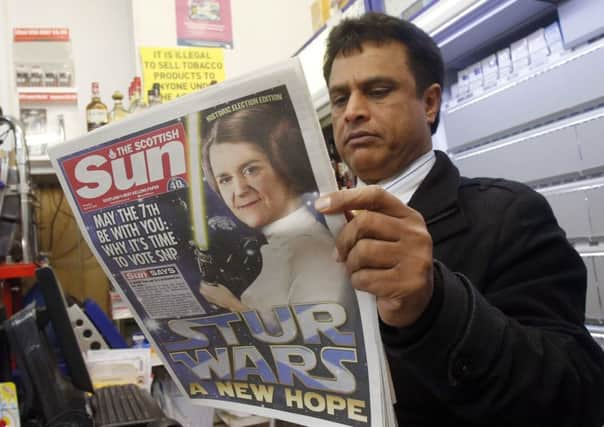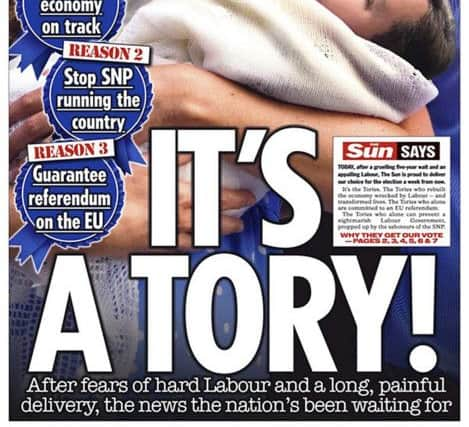Brian Wilson: Labour’s story written by its rivals


Off the back of the referendum, Alex Salmond announced that the price of SNP support for a Labour government would be delivery of full fiscal autonomy. Nice and clear-cut.
There was no talk of “over years”, to which the script has now been shamelessly adapted. While walking off with this dubious prize, the Nationalists would “hold Labour’s feet to the fire” on lots of progressive policies which they themselves had overlooked at Holyrood.
Advertisement
Hide AdAdvertisement
Hide AdAt the time, I took part in a radio programme based on this exciting offer and contributed a statement of the obvious – that the SNP had not the slightest interest in supporting a Labour government and their interests lay in achieving a Tory one, facilitated by taking lots of seats off Labour in Scotland.


Everything since has reinforced that analysis. But I recall the presenter’s response: “That’s a very cynical view,” she said huffily, as if I had come up with some outlandish conspiracy theory, to disturb the premise for her programme which was to accept Salmond at face value and proceed from there.
Months later, the paradox seems set in stone. Every Nationalist tactic is directed towards facilitating a Tory victory. Yet Labour has been painted into the corner of having to renounce deals with the SNP; a prospect which has simultaneously made that Tory victory more likely.
Yet what is the reality? Nobody can vote for a hung parliament. If there is one, the Tories as incumbents will get first shot at forming a government. If they fail and Labour can try, there would be no need for negotiations, conditions, deals, coalitions or anything else with the SNP. It would be a straightforward question of a majority for a Labour-scripted Queen’s speech. The dilemma would be entirely one for the SNP. They could vote for, against or abstain.
If they denied Labour a majority, their new army of MPs would be facing the electorate within weeks rather than the five allotted years. Having carried off the con trick of pretending their objective was to support a Labour government, they would be defending the fact they had just brought one down.
In short, there is not a snowball’s chance they would act in that way because of the price they would pay. The memory of 1979 is not entirely dead. They would have no choice but to allow Labour to remain in office – which is why they don’t want them there in the first place.
So why did Ed Miliband allow himself to be painted into the Scottish corner when the answer months ago should have been: “They can either back us or help bring us down. It’s entirely up to them.” I am sure this question has also baffled grateful Tory strategists.
If there is a Tory or Tory-led government after next Thursday, the Nationalists will revert to their old script about Scotland not having the government it voted for (i.e. themselves). There would be limited truth in this since it is now being waved under the noses of the Scottish electorate exactly what voting SNP is intended to result in.
Advertisement
Hide AdAdvertisement
Hide AdThere is no need to take my word for it since the front pages of the Sun’s two editions – English and Scottish – spelt it out more eloquently. The former told its readers to vote Tory to stop the SNP “running Britain” The latter told its readers to vote SNP as a “new hope”.
Two pincers within the same movement – the return of a Tory government. The day may have passed when Rupert Murdoch’s influence can swing elections, but his editorial strategy should confirm the coincidence of Tory and SNP interests has only one intended outcome. It sure ain’t a Labour government.
Labour does not have long left to remind voters about the true choices next Thursday. These are not about who will deal with whom but about how the power and resources of government will be used over the next five years. To that debate, the SNP is a sideshow even if they present themselves as ringmasters.
By failing to defend its record between 1997 and 2010, Labour made the most dangerous mistake of politics – it allowed others to write a false narrative which became received wisdom. That ground was largely conceded after the last election when Labour reverted to contemplating its own navel, preferring self-flagellation to self-belief.
When I hear Labour figures accosted for having done nothing except plunge the nation into debt, I wonder if they have heard of the London School of Economics report for the Rowntree Foundation which carried out the most comprehensive review of the last Labour government’s performance.
It concluded: “Until the crisis hit after 2008, spending levels were unexceptional by historic UK and international standards, and national debt levels were lower than when Labour took office… Increases in spending facilitated a reduction in child and pensioner poverty, shorter hospital waiting times, improved pupil-teacher ratios…
“There is a myth that Labour spent a lot and achieved nothing. The evidence shows that gaps narrowed on virtually all the socio-economic indicators that were targeted… Labour left the coalition with a legacy of more equal outcomes, less poverty and expanded public services”.
And then, when the global banking crisis hit, Labour handled it rather well, producing outcomes far, far better – not least for Scotland – than in other countries which suffered from the same plague of greedy, reckless bankers. Check out Ireland or Iceland or Greece.
Advertisement
Hide AdAdvertisement
Hide AdWhere have we heard any of that over the past six weeks? What would a similar audit of the Scottish Government’s performance conclude, in the unlikely event of one being permitted? It would find an NHS creaking at the seams, a growing number of semi-literate children and a total absence of measures to redistribute wealth from rich to poor, strong to weak.
There is a decent Labour record to defend, a message of hope to transmit and an alternative to be warned against. In their hearts, an awful lot of people know it and some of them may yet be persuaded to vote accordingly. The alternative is not Scotland’s say but Murdoch’s two ways to one goal.